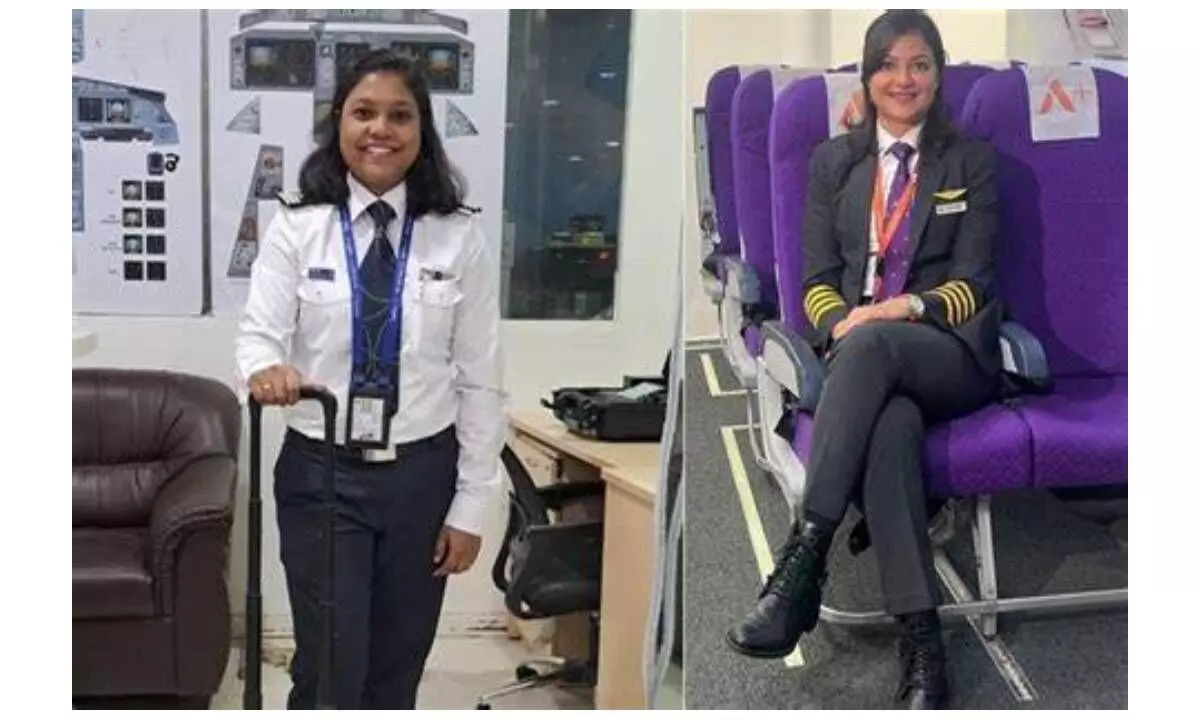Women 'pilot' India's aviation industry to new heights
"Flying does not rely so much on strength, as on physical and mental coordination," once said Raymonde de Laroche, the first lady to solo an airplane and the world's first licensed women pilot. These words, echoing through the annals of aviation history, are finding new resonance in India's contemporary skies
image for illustrative purpose

New Delhi, March: "Flying does not rely so much on strength, as on physical and mental coordination," once said Raymonde de Laroche, the first lady to solo an airplane and the world's first licensed women pilot. These words, echoing through the annals of aviation history, are finding new resonance in India's contemporary skies.
In a groundbreaking stride towards gender equality and representation, India's aviation industry is witnessing a historic surge in the number of female airline pilots. Recent data released by the Directorate General for Civil Aviation (DGCA) revealed that women now constitute a remarkable 14 per cent of airline pilots in India, surpassing the global average by more than twice the margin.
Aviation watchdog, DGCA, claimed to have issued a decade-high commercial pilot licences (CPLs) in 2023, with 18.12 per cent of them granted to women pilots, marking a remarkable upswing of 22.5 per cent compared to 2022 figures.
According to the DGCA, 294 CPLs were issued in 2023, compared to 240 in the previous year.
"This is the second consecutive year where the number of licences issued reached a decade high," said a senior DGCA official, emphasising the sustained momentum driving this transformative shift.
With the expectation that this trend will continue, India's aviation industry is poised for further advancements in gender inclusivity and representation.
The surge of women in aviation not only reflects a narrowing gender gap but also underscores the country's commitment to fostering a diverse and inclusive workforce.
As India celebrates International Women's Day, this milestone serves as a testament to the resilience and determination of women breaking barriers and charting new territories in traditionally male-dominated fields. Captain Pearl Varma, the first woman Type Rating Instructor at Akasa Air, expressed her pride in being part of India's aviation growth story.
"Our country is among the global leaders in empowering women professionals in aviation, and there is a noticeable increase in women's representation in the industry, including frontline roles," she remarked.
Varma highlighted Akasa Air's efforts in promoting gender diversity, with over one-third of its overall workforce and roughly half of its non-frontline comprising female employees.
Amid this celebration of progress, the story of Divya Nancy Tirkey, a resilient and determined woman, shines as an inspiration.
Born into a middle-class family with a deep connection to aviation, Tirkey's dream of becoming a pilot faced numerous challenges.
Initially discouraged by financial constraints, she pursued engineering but later embraced her passion for flying after a diagnosis of tuberculosis.
Despite facing setbacks and financial burdens, Tirkey's unwavering determination led her to fulfill her dream, eventually becoming a Senior First Officer with IndiGo. Tirkey's journey epitomises the power of perseverance and resilience in overcoming obstacles.
An evaluation during a roundtable discussion at the recent event 'Wings India 2024' also revealed that India currently has a 15 per cent representation of women in air traffic control, 11 per cent in-flight dispatch, including cabin crew, and 13 per cent at the mid-managerial levels.
"Amid the exponential growth of India's civil aviation sector, it is indisputable that the skies are expansive, offering ample space for the inclusion of more women. The launch of a new framework, featuring enhanced mentorship and sponsorship programs, will empower and catalyse this advancement. This framework will also propel Indian aviation into a more gender-inclusive future," said Jaideep Mirchandani, chairman of aviation major Sky One.
He said that to bring more women into aviation, we should acknowledge and celebrate the impressive accomplishments of women pioneers in various areas of aviation.
"These trailblazers can serve as inspirational role models for women aspiring to pursue various roles within these sectors," said Mirchandani.
"The proposed framework should also delve into a thorough examination of the opportunities and challenges as far as women's participation and leadership in STEM fields are concerned. This will facilitate a comprehensive approach to empowerment," Mirchandani added.

